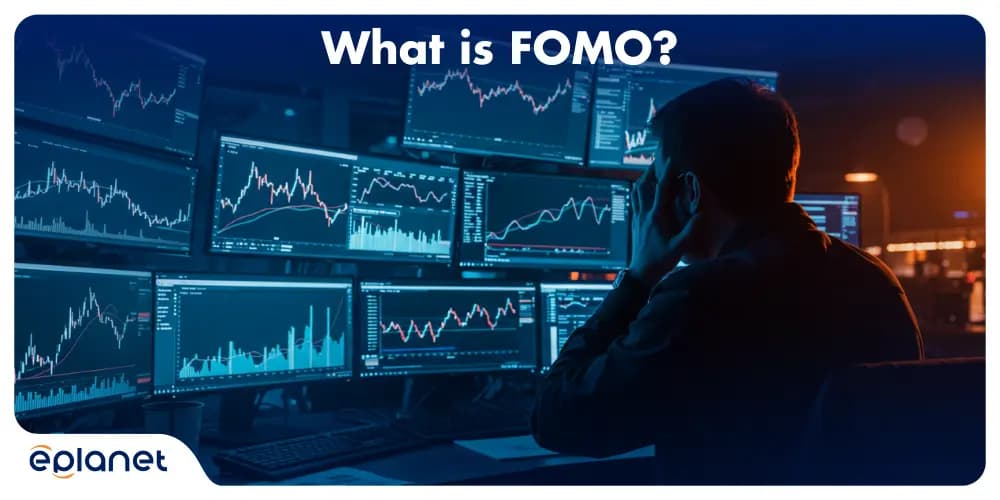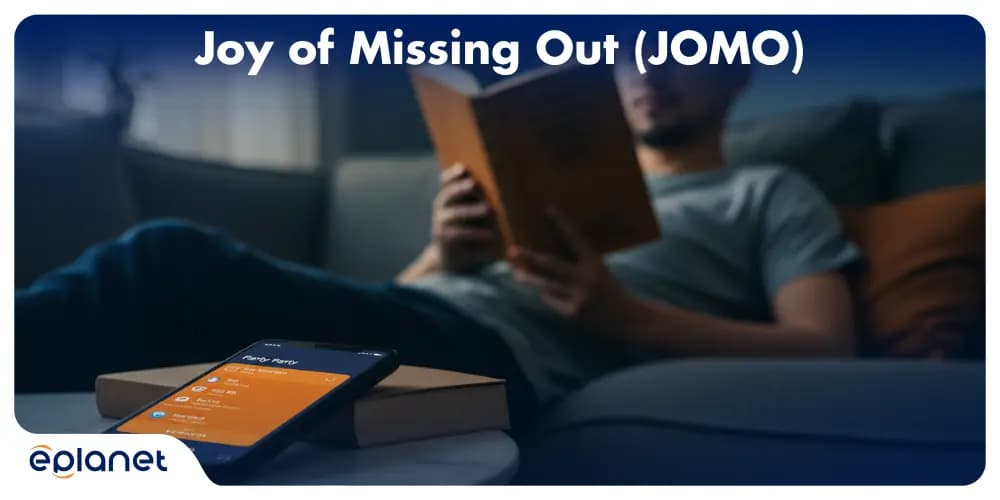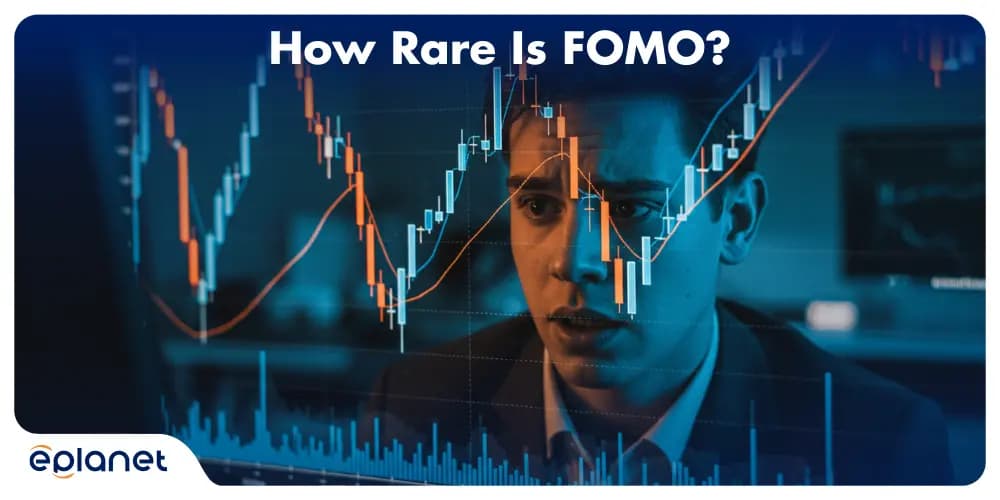How FOMO (Fear of Missing Out) Is Undermining Well-being And What To Do About It
Discover what FOMO really means, why it affects millions, and proven strategies to overcome fear of missing out in our hyperconnected world.



FOMO—that gnawing feeling that everyone else is living their best life while you're stuck scrolling through highlights reels. It's the modern epidemic silently sabotaging your peace of mind, turning every social media notification into a reminder of experiences you're supposedly missing. But here's the twist: understanding FOMO might just be your ticket to genuine contentment.
Introduction: The Invisible Prison We've Built for Ourselves
Picture this: You're having a perfectly lovely evening at home, maybe reading a book or binge-watching your favorite series. Then your phone buzzes. Instagram notification. Suddenly, you're face-to-face with photos of your college friend's spontaneous weekend getaway to Napa Valley, complete with wine tastings and golden-hour selfies.
That warm, cozy feeling? Gone. Replaced by an uncomfortable twisting in your chest—a mixture of envy, anxiety, and the nagging question: "What am I doing with my life?"
Now imagine that same scenario, but instead of vacation photos, you're staring at a trader's screenshot showing a 500-pip profit on EUR/USD while your own trading account sits untouched. The psychological response? Identical. The financial consequences? Potentially devastating.
Welcome to FOMO, or the fear of missing out. It's not just millennial slang anymore; it's a legitimate psychological phenomenon that's reshaping how we experience satisfaction, make decisions, and relate to our own lives—and for traders, how we manage risk and execute strategies.
I've been there. We've all been there. That moment when someone else's highlight reel makes your behind-the-scenes look painfully ordinary. In trading psychology, this same mechanism drives some of the most costly mistakes: revenge trading, position sizing errors, and chasing moves that have already happened.
But what if I told you that FOMO isn't just about missing out—it's about fundamentally misunderstanding what makes life meaningful and what makes trading profitable?
Key Takeaways
- FOMO is a real psychological response triggered by our brain's social comparison mechanisms and amplified by digital connectivity.
- It affects decision-making quality by pushing us toward quantity over meaningful experiences.
- Social media serves as FOMO's primary fuel, but the root causes run much deeper than Instagram envy.
- Practical strategies exist to rewire your relationship with comparison and cultivate genuine contentment.
- The opposite of FOMO isn't isolation—it's intentional living and what researchers call JOMO (Joy of Missing Out).
What Is FOMO?
Let's get one thing straight: FOMO isn't just about wanting to go to that party you weren't invited to. The fear of missing out is a pervasive anxiety rooted in social comparison and the belief that others are having rewarding experiences from which you're absent.
Dr. Dan Herman, who first coined the term in 2000, described FOMO as "a pervasive apprehension that others might be having rewarding experiences from which one is absent." But here's where it gets interesting—FOMO isn't new. What's new is how our hyperconnected world has turned it into a 24/7 anxiety channel.
Think about it this way: your great-grandmother probably experienced FOMO when she heard about the neighbor's fancy dinner party through town gossip. But she heard about it maybe once, from one person, days after it happened. You, on the other hand, get real-time updates from 500+ "friends" about their seemingly perfect moments, all day, every day.
The Psychology Behind Fear of Missing Out
FOMO taps into some of our deepest psychological needs and fears. At its core, it's about:
Social Belonging: Humans are wired to seek connection and acceptance within groups. When we see others engaging in activities without us, it triggers ancient survival mechanisms that equate social exclusion with danger.
Regret Avoidance: We're naturally loss-averse creatures. The possibility that we might be missing out on something amazing feels more painful than the certainty of our current situation.
Comparison as Information: Our brains use social comparison to gauge where we stand in the world. Social media provides endless comparison points, most of which are carefully curated highlight reels.
Who Is Most Likely to Experience FOMO?
Not everyone falls into the FOMO trap equally. Research shows certain groups are more susceptible:
Young Adults (18-30): Peak FOMO years coincide with major life transitions, identity formation, and heavy social media usage.
Heavy Social Media Users: More time on platforms equals more exposure to others' highlight reels.
People with Lower Life Satisfaction: Those already questioning their life choices are more vulnerable to FOMO triggers.
Individuals with Social Anxiety: Paradoxically, those who fear social situations also fear missing them.
But here's what surprised me when I dove into the research: high achievers and successful people aren't immune. In fact, they might be more susceptible because they're used to being "in the know" and having access to exclusive experiences.
DemographicFOMO LikelihoodPrimary TriggersCollege StudentsHighSocial events, career opportunitiesYoung ProfessionalsHighNetworking events, lifestyle experiencesParentsModerateFamily activities, personal timeOlder Adults (50+)LowerFamily gatherings, health-related activities
What Triggers FOMO in People?
Understanding your FOMO triggers is like having a roadmap to your insecurities. Here are the most common catalysts:
Social Media Scrolling: The big obvious one. Instagram stories, Facebook events, LinkedIn updates—they're all potential FOMO bombs.
Major Life Transitions: Starting college, changing jobs, moving cities. Times of uncertainty make us more sensitive to what others are doing.
Seasonal Events: Summer vacations, holiday gatherings, New Year's Eve. Culturally significant moments amplify FOMO.
Professional Milestones: Promotions, awards, conference invitations. Career FOMO is real and often underestimated.
Relationship Status Changes: Weddings, babies, engagements. Life milestone FOMO hits different because it feels more permanent.
I remember my own worst FOMO episode. I was working late on a Friday night (again) when Instagram showed me a group of former colleagues at what looked like the most epic rooftop party in the city. The photos were perfect: golden hour lighting, craft cocktails, everyone looking impossibly glamorous and carefree.
I spent the next hour spiraling, questioning every life choice that had led me to be alone in an office instead of living it up with people who clearly had their priorities straight. It took me three days to learn that the party was a work event for a company I'd never want to work for, and most attendees had been there out of obligation, not joy.

Social Media is a potential FOMO bomb
FOMO in the Age of Algorithms and Short-Form Content
FOMO has intensified in the era of algorithm-driven social platforms. Apps like TikTok, Instagram Reels, and YouTube Shorts are built to maximize attention through endless streams of highly curated content. Instead of occasional glimpses into others’ lives, users now consume hundreds of highlight moments in minutes.
This constant exposure accelerates social comparison. Your brain struggles to process such a high volume of polished success stories, travel clips, transformations, and achievements. Over time, this can create the false impression that everyone else is progressing faster or living more exciting lives.
Short-form content also distorts time perception. Major milestones are shown in seconds without the effort or setbacks behind them. Viewers may feel they are falling behind, even when their own progress is realistic and sustainable.
Another growing trigger is productivity-focused content. Influencers often showcase optimized routines, side hustles, and achievement milestones. While inspiring, nonstop exposure can turn rest into guilt and ordinary progress into perceived failure.
Recognizing how these platforms shape perception is essential. Modern FOMO is less about missing events and more about reacting to curated digital narratives. By approaching social media with awareness, setting boundaries, and remembering that feeds are edited representations, you can reduce comparison and maintain perspective.
Managing FOMO today is not about avoiding technology. It is about engaging intentionally, understanding how algorithms influence attention, and protecting your sense of self-worth from unrealistic comparisons.
Can FOMO Cause Depression?
This is where things get serious. While FOMO itself isn't classified as a mental health disorder, research consistently links it to increased rates of depression and anxiety, particularly among young adults.
Here's how the cycle typically works:
- Social Media Exposure: You see others' highlight reels
- Negative Comparison: You judge your behind-the-scenes against their highlight reel
- Mood Decline: This comparison triggers feelings of inadequacy
- Increased Usage: Ironically, you turn to social media for connection, exposing yourself to more triggers
- Deepening Negativity: The cycle reinforces itself
Dr. Sherry Turkle from MIT has spent decades studying technology's impact on mental health. Her research suggests that constant exposure to others' curated experiences can create what she calls "compare and despair" cycles that contribute to depression.
But—and this is crucial—FOMO doesn't cause depression in a vacuum. It typically interacts with existing vulnerabilities like low self-esteem, social anxiety, or life dissatisfaction.
Is FOMO a Trauma Response?
Now we're getting into fascinating territory. Some psychologists argue that FOMO can indeed be a trauma response, particularly for people who experienced early social rejection or abandonment.
Think about it: if your nervous system learned early that social exclusion equals danger, then seeing evidence that others are connecting without you might trigger a legitimate threat response. Your body doesn't distinguish between being left out of a childhood birthday party and missing a work happy hour—both can activate the same survival circuits.
This explains why FOMO can feel so physically uncomfortable. It's not just disappointment; it's your nervous system sounding alarm bells.
What Does Athazagoraphobia Mean?
While we're exploring related concepts, let's talk about athazagoraphobia—the fear of being forgotten or ignored. It's like FOMO's deeper, more existential cousin.
If FOMO is "What am I missing?", athazagoraphobia is "Will anyone remember I existed?" People with this fear aren't just worried about missing events; they're terrified of becoming irrelevant.
Social media amplifies both fears by creating platforms where relevance is measured in likes, comments, and story views. When your post gets ignored while others go viral, athazagoraphobia kicks in: "Am I forgettable?"
How Do You Cure FOMO? Practical Strategies That Actually Work
Alright, let's get to the good stuff. How do you break free from FOMO's grip? The answer isn't to delete all your social media accounts and become a hermit (though if that works for you, go for it). It's about developing what I call "intentional awareness."
Strategy 1: The Reality Check Method
Before you spiral into FOMO, ask yourself these three questions:
- What actual information do I have about this situation?
- How do I typically feel during/after similar events?
- What am I afraid of missing, specifically?
Often, you'll realize you're projecting perfection onto incomplete information.
Strategy 2: Curate Your Digital Diet
Just like you wouldn't eat junk food for every meal, stop consuming junk content. Unfollow accounts that consistently trigger comparison. Follow people who share authentically, including struggles and mundane moments.
Strategy 3: Practice Gratitude Redirection
When FOMO hits, immediately list three things you're grateful for about your current situation. This isn't toxic positivity—it's rewiring your brain to notice what's present instead of fixating on what's absent.
Strategy 4: Embrace JOMO (Joy of Missing Out)
JOMO is about finding genuine pleasure in your choices, even when they mean missing other opportunities. Had a quiet night in while others went out? Celebrate the rest you gave yourself. Skipped the networking event to spend time with family? Honor that priority.
According to Verywell Mind, developing JOMO requires intentional practice but can significantly improve life satisfaction and reduce anxiety.

Joy of Missing Out (JOMO)
Can Therapy Help with FOMO?
Absolutely. Several therapeutic approaches have proven effective for FOMO-related anxiety:
Cognitive Behavioral Therapy (CBT): Helps identify and challenge the thought patterns that fuel FOMO.
Mindfulness-Based Therapies: Teach present-moment awareness and reduce compulsive social comparison.
Acceptance and Commitment Therapy (ACT): Focuses on values-based living rather than external validation.
Social Media Digital Detox Programs: Structured approaches to reducing platform dependency.
A therapist can help you understand whether your FOMO stems from deeper issues like social anxiety, attachment trauma, or depression. Sometimes what looks like simple social comparison is actually a symptom of something more complex.
What's the Opposite of FOMO?
The opposite of FOMO isn't apathy or isolation—it's intentional engagement. Researchers have identified several positive alternatives:
JOMO (Joy of Missing Out): Finding satisfaction in your chosen priorities, even when they mean missing other opportunities.
FOGO (Fear of Going Out): While this sounds negative, for some people recovering from FOMO, a temporary preference for familiar environments can be healthy.
Mindful Presence: The ability to be fully engaged in your current experience without mental comparison to alternatives.
Values-Based Decision Making: Choosing activities based on personal values rather than social pressure or FOMO.
FOMO in Different Life Stages
FOMO Baby: Early Childhood Development
Even very young children experience primitive FOMO. Watch toddlers play—they'll abandon a perfectly good toy the moment they see another child with something different. Child development experts call this "grass is greener" syndrome, and it's a normal part of learning social comparison.
The key for parents is helping children develop internal satisfaction rather than constantly seeking external stimulation.
Teen and Young Adult FOMO
This is peak FOMO territory. Identity is forming, social hierarchies matter intensely, and social media provides endless comparison material. Teen FOMO often focuses on:
- Social events and parties
- Romantic relationships
- College and career choices
- Fashion and lifestyle trends
Adult FOMO: Career and Family Edition
Adult FOMO shifts focus but doesn't disappear. Common themes include:
- Career advancement and opportunities
- Family milestones (marriage, children, homes)
- Travel and lifestyle experiences
- Health and fitness achievements
Age GroupPrimary FOMO TriggersCoping StrategiesChildren (5-12)Toys, activities, friend groupsTeach gratitude and internal satisfactionTeens (13-18)Social events, relationships, achievementsLimit social media, encourage real-world activitiesYoung Adults (19-25)College experiences, career starts, independenceFocus on personal growth and authentic connectionsAdults (26-40)Career advancement, family milestones, lifestyleValues clarification and priority settingOlder Adults (40+)Health, family connections, legacyAcceptance practices and wisdom sharing
The Neuroscience of FOMO: What's Happening in Your Brain
Understanding the brain science behind FOMO can be incredibly liberating. When you realize that your anxiety is a predictable neurological response, it becomes easier to work with rather than against.
The Dopamine Connection: Social media platforms are designed to trigger dopamine release through variable reward schedules. Every notification is a potential "hit," keeping you coming back for more.
The Comparison Circuit: Your brain's anterior cingulate cortex and medial prefrontal cortex activate during social comparison. These same regions are involved in physical pain, which is why social rejection literally hurts.
The Fear Center: The amygdala processes FOMO as a threat, triggering fight-or-flight responses even though you're just looking at vacation photos.
FOMO and Decision Making: Why It Leads to Poor Choices
One of FOMO's most insidious effects is how it sabotages decision-making. When you're afraid of missing out, you often end up making choices based on fear rather than genuine preference.
I see this constantly in my friends' lives. The person who says yes to every social invitation and ends up exhausted and resentful. The professional who applies for jobs based on prestige rather than fit. The student who chooses a major because it looks impressive on social media.
FOMO decision-making typically involves:
- Quantity over Quality: Trying to do everything instead of doing fewer things well
- External Validation Seeking: Choosing based on how it will look to others
- Present Bias: Overvaluing immediate experiences while undervaluing long-term consequences
- Analysis Paralysis: Being so afraid of making the "wrong" choice that you make no choice at all
The FOMO Decision Framework
Next time you're facing a decision influenced by FOMO, try this framework:
- Pause: Take 24 hours before deciding if possible
- Clarify Values: What matters most to you, independent of others' opinions?
- Consider Costs: What are you giving up to pursue this opportunity?
- Check Motivation: Are you running toward something you want or away from the fear of missing out?
- Visualize Outcomes: How will you feel about this decision in six months?
How Rare Is FOMO? The Statistics Might Surprise You
FOMO is far more common than most people realize. Research indicates:
- Most millennials and Gen Z adults experience FOMO regularly
- Heavy social media usage is consistently linked to increased FOMO-related anxiety
- Consumer behavior studies show FOMO significantly drives purchasing decisions
- FOMO intensity typically peaks during young adult years (18-33)
But here's what's really interesting: FOMO isn't evenly distributed across all social media platforms. Instagram and Snapchat tend to trigger more FOMO than Twitter or LinkedIn, likely due to their visual, lifestyle-focused content.

How Rare Is FOMO?
FOMO as a Positive Thing? When Missing Out Actually Helps
Plot twist: not all FOMO is harmful. Sometimes the fear of missing out can be a helpful motivator that pushes you toward growth and new experiences.
Healthy FOMO tends to:
- Motivate you to try new things within your values
- Connect you with like-minded communities
- Push you out of your comfort zone in beneficial ways
- Help you recognize when you're becoming too isolated
Unhealthy FOMO tends to:
- Drive decisions based on others' expectations
- Create anxiety and dissatisfaction with your current life
- Lead to overcommitment and burnout
- Fuel addictive social media behaviors
The difference? Healthy FOMO aligns with your authentic interests and values. Unhealthy FOMO is driven by comparison and external validation.
How to Deal with Someone Who Has FOMO
If you're in a relationship with someone who struggles with FOMO—whether romantic, friendship, or family—here are strategies that actually help:
Don't Minimize Their Feelings: Saying "just don't look at social media" is like telling someone with depression to "just think positive thoughts." FOMO triggers real neurological responses.
Help Them Identify Triggers: Support them in recognizing patterns without judgment.
Model Healthy Boundaries: Show through your own behavior how to say no to things that don't align with your values.
Encourage Professional Help: If FOMO is significantly impacting their mental health or relationships, therapy can be incredibly beneficial.
Practice Patience: Overcoming FOMO is a process, not a one-time decision.
FOMO and Different Mental Health Conditions
FOMO often intersects with other mental health challenges:
FOMO and Anxiety Disorders
People with generalized anxiety disorder may experience FOMO as part of their overall worry patterns. The "what if" thinking that characterizes anxiety extends to social situations: "What if this event is amazing and I miss it?"
FOMO and Depression
Depression can both cause and result from FOMO. Low self-esteem makes social comparison more painful, while FOMO-driven isolation can worsen depressive symptoms.
FOMO and ADHD
The dopamine-seeking behavior common in ADHD can make social media's variable reward schedules particularly addictive, amplifying FOMO.
FOMO and Autism
Individuals on the autism spectrum might experience FOMO differently, often related to special interests or social anxiety about missing important information within their communities.
FOMO in Forex Trading: When Fear Costs Pips
One of the most expensive places FOMO shows up? Your forex trading account. Trading psychology and FOMO are intimately connected in the currency markets, and understanding this relationship can literally save you thousands of dollars and countless pips.
I've watched traders blow their accounts chasing breakouts they missed or revenge trading after seeing others profit from moves they didn't take. The fear of missing out on the "big move" triggers some of our most irrational trading decisions in forex.
The Psychology Behind Forex FOMO
Herd Mentality in Currency Markets: When you see other traders posting screenshots of massive EUR/USD profits, your brain interprets this as social proof that you should jump in. But forex markets move fast—what's trending on social media is often what's already overextended.
Loss Aversion in Trading: Normally, we hate losing money more than we enjoy gaining it. But FOMO flips this script in forex. The fear of missing a 200-pip move becomes more painful than the risk of a 50-pip loss.
Recency Bias and Currency Pairs: That trader who caught the GBP/JPY volatility spike last week becomes more influential in your thinking than the dozens of failed trades you don't see posted.
News Event FOMO: Central bank announcements, NFP releases, inflation data—forex traders often feel compelled to trade every major news event for fear of missing "the big move."
Risk Management: Your Forex FOMO Firewall
Smart risk management in forex isn't about catching every move—it's about making conscious, calculated decisions rather than emotional, fear-driven ones. Here's how to build FOMO-proof forex strategies:
The 2% Risk Rule: Never risk more than 2% of your account on any single trade, regardless of how "sure" the setup looks or how much others are making.
Position Size Calculator: Use proper position sizing based on your stop loss, not on how much you want to make. FOMO often leads to oversizing positions.
Pre-Market Analysis: Do your technical and fundamental analysis before markets open, not while staring at price action. FOMO thrives when you're reacting in real-time.
Trading Plan Discipline: Write your trading plan when markets are closed. Stick to it when they're open. FOMO setups rarely align with systematic approaches.
Forex Trading Psychology: The Mental Game of Pips
Professional forex traders have learned that trading psychology matters more than technical indicators or fundamental analysis. Here are the psychological principles they use to combat FOMO:
Risk-Reward Ratios: Focus on trades with favorable risk-reward ratios (minimum 1:2) rather than chasing high-probability "sure things" that everyone's talking about.
Trade Journaling: Keep detailed records not just of entries and exits, but why you took each trade and your emotional state. Pattern recognition helps break FOMO cycles.
Market Hours Discipline: Trade only during your predetermined market sessions. FOMO often strikes during off-hours when you see overnight moves you missed.
Currency Pair Selection: Stick to major pairs you understand well rather than exotic pairs that are "hot" on social media.

Forex Trading Psychology
FOMO Trading BehaviorProfessional ApproachTypical OutcomeChasing breakouts without confirmationWait for pullbacks and re-entry signalsFOMO: Buy tops, sell bottomsTrading every news eventSelect high-probability news trades onlyProfessional: Consistent profitsFollowing social media tipsIndependent technical/fundamental analysisFOMO: Emotional volatilityOversizing positions on "sure things"Consistent 1-2% risk per tradeProfessional: Account preservationRevenge trading after missed movesStick to trading plan regardlessFOMO: Account blowouts
Common Forex FOMO Scenarios and How to Handle Them
The Missed Breakout: You had EUR/USD on your watchlist, but didn't take the trade when it broke resistance. Now it's up 100 pips and you're tempted to chase.
- Solution: Wait for a pullback to support (former resistance) or find the next setup.
The News Event: Non-Farm Payrolls just released and USD pairs are moving violently. Everyone's making money except you.
- Solution: News trading requires specific skills and preparation. If you haven't prepared, sit it out.
The Social Media Success: A trader posts a 500-pip GBP/JPY win and you feel like you're missing out on volatility.
- Solution: Remember that for every posted win, there are likely multiple losses that aren't shared.
The Overnight Gap: You wake up to find that your analysis was right, but you didn't have a position on because you don't trade overnight.
- Solution: Celebrate being right about market direction. Profits missed are not losses made.
The most successful forex traders I know aren't the ones who never experience FOMO—they're the ones who have systems in place to prevent FOMO from driving their trading decisions.
The Future of FOMO: Where Are We Headed?
As technology evolves, so does FOMO. We're seeing new variations emerge:
Investment FOMO: Fear of missing the next big financial opportunity, amplified by social trading platforms
Metaverse FOMO: Fear of missing virtual reality experiences and digital social gatherings
AI FOMO: Anxiety about falling behind in AI literacy and technology adoption
Climate FOMO: Urgency around environmental experiences that might not exist in the future
Wellness FOMO: Pressure to try every new health trend and optimization strategy
The key insight? FOMO evolves with culture and technology, but the underlying human needs—for connection, meaning, and belonging—remain constant.
Building Your Personal FOMO Recovery Plan
Recovery from chronic FOMO isn't about eliminating all social comparison—that's impossible and probably not even desirable. It's about developing a healthier relationship with choice, comparison, and connection.
Week 1-2: Awareness Building
- Track your FOMO triggers for two weeks
- Notice physical sensations when FOMO hits
- Identify your most problematic social media platforms
Week 3-4: Digital Boundaries
- Implement specific social media time limits
- Curate your feeds to reduce trigger content
- Practice the 24-hour rule before responding to FOMO impulses
Week 5-6: Values Clarification
- Write down your top 5 life values
- Practice making decisions based on values rather than comparison
- Experiment with saying no to FOMO-driven invitations
Week 7-8: Community Building
- Identify one or two relationships you want to deepen
- Practice vulnerable, authentic sharing with trusted friends
- Focus on quality over quantity in social connections
Ongoing: Integration and Maintenance
- Regular digital detoxes (monthly or quarterly)
- Continued therapy or support group participation
- Mindfulness or meditation practice
- Regular values check-ins and course corrections

FOMO Recovery Plan
The Role of Community in Overcoming FOMO
One of the most powerful antidotes to FOMO is genuine community—the kind where you can be authentically yourself, struggles and all. This might be:
- A close-knit friend group that shares honestly
- A therapy group or support community
- A hobby-based community with shared interests
- A spiritual or philosophical community
- An online community focused on similar challenges
The key is finding spaces where connection doesn't depend on having impressive experiences to share.
FOMO in Relationships: Romantic, Family, and Friendship Dynamics
FOMO doesn't just affect individual well-being—it can significantly impact relationships at every level.
Romantic Relationships and FOMO
- Partners may feel inadequate when their relationship doesn't match social media standards
- FOMO can drive infidelity or relationship dissatisfaction
- Couples might overplan activities to compete with others' relationships
- Decision-making becomes complicated by fear of missing better options
Family FOMO
- Parents experience FOMO about their children's activities and achievements
- Adult children may feel guilty about missing family events
- Extended family comparisons can create tension and competition
- Holiday and milestone celebrations become performance rather than connection
Friendship FOMO
- Friend groups may struggle with inclusion and exclusion dynamics
- Social media makes friendship hierarchies more visible
- People may maintain superficial connections to avoid missing out
- Authentic friendships suffer when interactions become performative
Conclusion: Your Liberation from the Fear of Missing Out
Here's what I've learned after years of studying and personally grappling with FOMO: the fear of missing out is actually a fear of not being enough—not successful enough, social enough, interesting enough, worthy enough.
But here's the liberating truth: you are enough, exactly as you are, exactly where you are. The experiences you're having right now—even the quiet, undocumented ones—have value. The life you're building—even if it doesn't look like anyone else's—matters.
FOMO thrives in the gap between where you are and where you think you should be. But what if that gap isn't a problem to solve but simply information about your human tendency to compare and strive? What if the goal isn't to eliminate FOMO entirely but to develop a kinder, more curious relationship with it?
The most profound shift happens when you stop trying to avoid missing out and start choosing what to miss out on. Because here's the secret nobody talks about: missing out is inevitable. You can't do everything, be everywhere, experience all possibilities. The question isn't how to avoid missing out—it's how to miss out well.
Your FOMO recovery isn't about becoming indifferent to opportunities or disconnecting from community. It's about developing the discernment to recognize which opportunities align with your deepest values and the courage to say no to everything else.
So the next time FOMO hits—and it will—remember this: the most interesting people aren't those who never miss out. They're the ones who miss out intentionally, who choose depth over breadth, who understand that a life well-lived isn't about collecting experiences like trophies but about being fully present for the experiences you choose.
Your life isn't happening somewhere else, in someone else's Instagram story or at an event you weren't invited to. It's happening right here, right now, in the ordinary magic of your actual existence.
